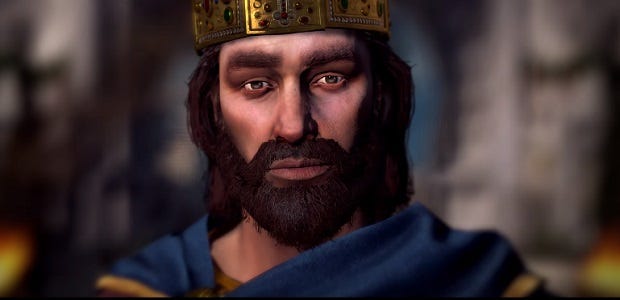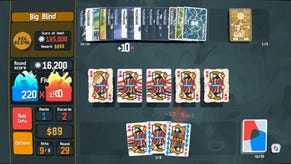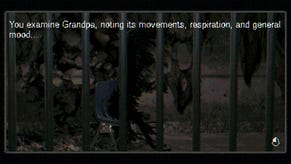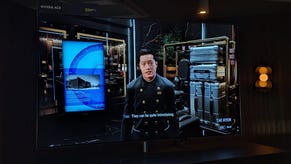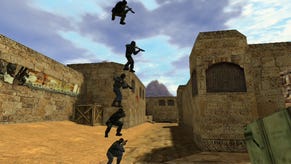The Best And Worst Total War Games
We've put them in order from best to worst
At its best, the Total War series casts a spell over you. Your empire rises from nothing, surrounded by enemies who are poised to trample it into the dust. Each decision on the strategic level is a gamble on the immediate future, where "one more turn" isn't just a stepping-stone to a new upgrade, but a perilous step onto thin ice. Each time you take to the battlefield is another do-or-die moment, a possible Hastings or Austerlitz that can open the road to conquest or plunge you into a desperate fight for survival.
But the Total War series has also been defined by massive, abrupt swings in quality. While the series has been on a linear trajectory in terms of graphics, the quality of the games underlying those vivid battlefield vistas has varied wildly. Total War at its best is interactive Kurosawa and Kubrick. At its worst, it's a middle-school history textbook as told by Drunk History and filmed by the cast and crew of The Patriot.
So before the series (temporarily) leaves history behind for the grimdark faux-history of Warhammer fantasy, let's put into order the times that Total War was at its best… and why sometimes its lows were so very low. We'll save the worst for last, because if there's one thing that every Total War fan loves, it's an argument over which games were the biggest disappointments.
Total War: Shogun 2
Claim to Fame: Of all the Total Wars, it's the Total-est.
Hidden Flaw: Secretly conservative and unambitious
If you could only play one Total War, if you could only have one for your desert island exile, it should be this one. Shogun 2 is where all the series' best ideas have been gathered into one game, and married to a gorgeous aesthetic inspired by its setting. And with its Fall of the Samurai expansion, Shogun 2 also turned into the best gunpowder-era Total War.
All Total War games have had impressive graphics for their time, but Shogun 2 remains beautiful even today. Its look owes more to films like Kurosawa's Ran and Kagemusha than to reality, and gives each battle a vivid, dreamlike quality that's unmatched by any other Total War. Once the battle is joined and the last reserves have been committed, Shogun 2 is a game where you can just zoom to ground-level and watch individual sword duels play out amidst all the lovely carnage.
The series' return to Japan and its self-contained strategic context also solves a lot of other problems. The factions are all roughly balanced because they are from the same civilization and share the same level of development. The narrow and mountainous geography of Japan also gives the perennially hapless campaign AI a chance to succeed.
No other Total War game does a better job combining the fantasy, the history, and the game design. This is the series at its very best, its arrival at a goal it started chasing with Shogun and Rome.
Total War: Attila
Claim to Fame: Tries (and succeeds!) new ideas
Hidden Weakness: It's about as balanced as Caligula
After Rome 2, it was hard to be optimistic about the future of Total War. Shogun 2 succeeded because it took a couple good ideas from Napoleon Total War and ignored just about everything else the series had tried since Rome. Was the future of Total War just going to be repackaged hits?
Attila takes a look at that trend and veers off in a new direction. It changes the basic rules of the Total War series in order to do justice to the death of the Roman world. Cities burn, regions are devastated, and an endless onslaught of nomadic tribes attempt to burrow their way into the Roman empire and carve out a place in the sun. Meanwhile, Roman generals turn against successive emperors, and the Huns hit like a tsunami.
Attila might be the most inventive and exciting design Total War has ever had, particularly at the strategic level. For once, dynastic politics don't feel like a waste of time, and the different types of factions give the game a real "clash-of-civilizations" feel. And unlike the original Barbarian Invasion expansion for Rome, Attila gives the non-Romans their historical due so they aren't just interchangeable hordes descending on the fading light of civilization.
That said, there's no other Total War game where you can feel the darkness drawing-in the way it does in Attila. It lends a real sense of gravity to those battles. Lose a battle in earlier Total War games, and you suffered a setback. In Attila, a lost battle likely means that a city and its inhabitants are about to disappear. No pressure.
Medieval: Total War
Claim to Fame: Perfects the early Total War design
Hidden Weakness: There's not all that much to that design
In its second outing, the Total War series attained near-perfection. I'm still not sure a more balanced Total War game has ever materialized. The Risk-style map is easy for the AI to manage, and the different starting positions of each kingdom and empire allows for some true AI superpowers to form and challenge players late in the game.
To this day, I have an almost Pavlovian distaste for all things Byzantine because of an especially painful game in which they slowly, inexorably rolled my English empire back from Poland and Egypt all the way to the Channel. Yet those bitter memories are tempered by all the apocalyptic battles we fought along the way as my increasingly beleaguered armies fought a doomed holding action across Europe against the tide of imperial-purple death.
The other thing Medieval did brilliantly was portray a world completely torn to pieces by religious strife. Jihads and Crusades marched back and forth across the Mediterranean, each a terrible force in the right hands but driven by a ceaseless need for conquest that almost invariably led them to disaster. The logic that governs other military campaigns (most importantly, knowing when to stop) doesn't work with militant religious expeditions. So huge armies of zealots march to their death repeatedly over the course of this game, throwing the game into chaos.
The role of the Pope in Medieval: Total War also deserves special mention as one of the most enjoyably infuriating villains of any strategy game. Just when things are starting to go well for a Catholic ruler, the Pope can always be trusted to screw things up for the next ten years, which makes Medieval a pretty good argument for the Peace of Westphalia.
Medieval is a triumph of simplicity, and it took a decade for Total War to come close to matching it.
Napoleon: Total War
Claim to Fame: The greatest hits of the horse-and-musket era
Hidden Weakness: Has very little to do with actual Napoleonic warfare.
On the heels of the disappointing Empire, Napoleon did two things to right the listing Total War ship. First, it got specific about its era. Rather than being a vague pastiche of 18th century warfare, it focused on the armies of the Napoleonic wars and the career of the man who gave the era its name. That makes for a better and more manageable strategy game than Empire but, it also means something far more important: extravagantly detailed military uniforms!
Napoleon still doesn't completely come to grips with warfare in the horse-and-musket era. When the campaign begins, none of the foremost powers of Europe have figured out that you can have two and even three ranks of soldiers firing simultaneously if the guys in front take a knee. It takes years of research for someone to have this idea, apparently. Grenadiers also throw grenades at close range, which is Total War at its most endearingly literal.
But it doesn't matter because Napoleon is such a beautiful, wistful game. The lighting is more dramatic than in Empire, giving all the action the look of the great oil-paintings that memorialize many of the pivotal moments of the Napoleonic Wars. Smoke billows and hangs over lines of blue-coated French soldiers, soldiers march into battle to the sound of fife and drum, and waves of cavalry dash themselves against dense squares of infantry.
After the unfocused Empire, Napoleon gave people what they wanted: huge, bloody battles between fabulously-dressed European armies and the chance to play through one of the most astonishing military careers in history. With its Peninsular War DLC, Napoleon also helped establish a trend of odd, experimental expansion campaigns that would eventually help the series to break new ground with games like Attila.
Continue reading about the best Total War games on page two.
Shogun: Total War
Claim to Fame: Laid the groundwork for everything to come
Hidden Weakness: Not a lot built on those foundations here
It's appropriate that Shogun lands in the middle of this series. It's the founder of a great strategy game empire, and I have an affection for it that goes far, far beyond the game itself. What Shogun did was almost unimaginable at the time it came out. It let you control an entire strategic campaign, from any side, but also take command of epic real-time battles? It was a dream made real.
Shogun is also a beautiful, elegant game in a way that few of its descendants have managed to replicate. The hand-drawn map with its miniature figurines representing armies and agents deployed in the field, the throne room from which you conducted your diplomatic affairs, the traditional music that played during battles… Shogun does everything possible to make you feel like you'd been transported to another place and time. On the battlefield, where each province has its own unique map, armies wage war over a mythic topography of Japan, where armies fired arrows from sheer mountain slopes and cavalry rolled like thunder down through deep valleys.
It has its flaws and strange touches like little movies showing ninjas dying tragicomic deaths while on missions, or geisha murdering your rivals with the same delicate fastidiousness with which a cat attends its litterbox. The strategic layer itself is very thin, and the near-identical factions were interchangeable. But those issues are nothing compared to how new and amazing this inaugural Total War was.
That Shogun rates so low on this list is a testament to the ways in which the Total War series grew beyond its origins.
Rome: Total War
Claim to Fame: The first "modern" Total War
Hidden Weakness: How much time do you have?
Wait, what the hell is Rome: Total War doing down here? It's the game that made the Total War series a blockbuster franchise, so how is it one of the low-points of the series?
Simple: Rome is the snake in the Total War garden. It was seductive and promising, but it also introduced a raft of new ideas and complications that were either poorly-conceived or poorly executed. New Total War games came and went, but the rot behind the edifice remained.
Yet there was undeniable greatness here. The sprite-based armies of the first two games were replaced by unbelievably detailed and lifelike armies of individual 3D models that brought history to life as never before. Watching legionaries go leaping over the ramparts of a Greek citadel and into hand-to-hand combat with dense rows of archers, or seeing lines of infantry and cavalry marching across a European plane towards the last army of a barbarian king gave me chills. The Roman endgame, with its sudden plunge into civil war between the Roman faction, may also be the best finale that any Total War campaign has ever managed.
But Rome is also the game where the series developed AI problems that it would consequently prove unable to solve despite repeated efforts. While the gorgeous 3D battle maps were a revelation, the 3D strategic map proved to be a millstone around the neck almost every subsequent Total War game. The AI factions couldn't use it effectively, nor could they build the kind of advanced empires needed to support high-level units. The strategy half of the Total War equation was practically lost.
Rome was impressive for its time, but it left a legacy of mediocrity. Rome was a huge success in part because it was so gorgeous and atmospheric that nobody noticed the game didn't work.
Medieval 2: Total War
Claim to Fame: Medieval again but like Rome this time
Hidden Weakness: Medieval again but like Rome this time
This is a tough game to rank because it shares almost all of its flaws with Rome: Total War but without the novelty and freshness that Rome could boast. On the other hand, it does work ever so slightly better than Rome.
That's partly down to the setting. Rome tells its story from a position of Roman supremacy. The Romans can keep upgrading cities and units until nobody can stop them. The barbarian factions, on the other hand, are operating with a huge series of handicaps, so a lot of the wars are lopsided. Medieval assumes rough parity between the various medieval kingdoms and their armies, and so at least the fighting tends to be good. Toss in some early pike-and-shot warfare in the late stages of the game, and Medieval features a pretty good tactical game by the end.
Still, it's all stuff that the series had covered in its recent past, but tied to the terrible design for Rome. While it may be a better game than Rome, it's not memorable like Rome. Rome is a tragic hero, fatally flawed and hugely ambitious. Medieval 2 is Rosencrantz and Guildenstern.
Empire: Total War
Claim to Fame: Total War attempts grand strategy
Hidden Weakness: It fails
This may be the strangest Total War ever made. On the one hand, it's wildly ambitious. The action takes place across the Americas, India, Europe, and the sea lanes in between. There is technological progress as the Enlightenment paves the way for Industrial Revolution. It's the first Total War to really try and represent historical complexity, to wrestle with the double-edged swords of progress and imperialism. No, the campaign AI never really got a grasp on the game or the multi-region world map, rendering a lot of this new complexity dead-on-arrival, but Empire gets credit for trying something new.
On the other hand, there may not be another Total War that gives less of a damn about the era it depicts. Regimental uniforms? Empire has never heard of them, but instead imagines 17th century warfare to be something conducted by a bunch of guys wearing identical wool coats dyed different colors. They carry muskets and rifles, but aren't too clear on their purpose, since the AI just charges with everything it has the moment it spots the enemy. Sailing ships? Empire thinks they, and the wind that powers them, are too complicated, so it reimagines the Age of Sail as a more sluggish version of Sid Meier's Pirates. A community theater Gilbert and Sullivan revival shows more care and concern for historical detail than Empire. The jury is still out on which is more fun, however.
And finally...
Rome 2: Total War
Claim to Fame: Remember how much you liked Rome?!
Hidden Weakness: Yes, we do.
Credit where it is due: the Emperor's Edition made Rome 2 a lot better than it was at launch. On the other hand, when you've hit rock-bottom, up is the only direction you can go.
Rome 2 may no longer be the worst Total War game ever made. It works better than Empire does these days. But it remains uninspired, full of systems that don't really work well together and held hostage by a sprawling map that's full of empty space and endless delays. Want to sail a fleet from the Adriatic coast of Italy to the tip of Sicily? That will be three turns, please. Want to make like Caesar and invade Gallia? Hope your legion brought their walking shoes, because that's all they are going to be doing for a while.
Rome 2 somehow dumps everything that made Rome memorable while also losing the refinement that made Shogun 2 the pinnacle of the series. Dynastic politics remain a feature, but without any engaging systems to help manage them. The Roman Civil War strikes like a bolt from the blue, devoid of any feeling that old allies and friends are somehow turning against one another. Even the battles themselves feel like cartoon versions of history, as flaming arrows turn into 2nd century B.C. cluster bombs, and the Rome 2 version of Egypt appears to be on loan from Age of Mythology.
Rome and Empire may have been flawed, but those flaws stemmed from ambition that went beyond "old game, new engine". Rome 2 aims low and still falls short. If anything can be said for it, it is that Rome 2 is the game that seemed to shake the series from its torpor, leading to the beautiful, series-salvaging chaos of Attila. Ironically, then, the weakest Total War in the series' history may be the most important one since the first Shogun.
